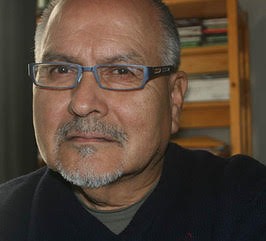
BIO
Juan R. Palomo was a journalist for more than 20 years. Most of those years were at the Houston Post, as a general assignment reporter, political reporter, foreign correspondent, Washington correspondent, columnist and editorial writer. He covered religion for the Austin American Statesman for several years and wrote a monthly op-ed column for USA TODAY. Born in North Dakota to migrant-worker parents, Palomo grew up in Crystal City, Texas. He attended Southwest Texas Junior College and Texas State University and received an MA in journalism from The American University in Washington. Palomo lives in Houston where he writes, paints and photographs. His blog is juanzqui.com.
Speed Queen, North Dakota 1983
Halfway between Johnstown and Forest
River
a gravel road leads to where the migrant
camp once
stood. Some twenty years have passed and
it should
come as no surprise that almost nothing
remains.
The seven crumbling cottages, summer homes
for our
extended clan, have long ago been razed,
the weathered
walls and roofs no doubt now part of el dompe, a mile or so
up the road, whose moldy mounds we once sifted
for toys.
A windbreak stretching half a mile behind
the seven
shacks is gone now, except for a dozen
or so trees. One
clue that people once lived here is a solitary
telephone
pole with flaccid lifeless wires and a gutted
meter
gawking at the rows of sugar beets in
the nearby fields.
A new batch of trees has been planted. Scattered
among them,
Half-buried in the black earth, I come
across a few of
the things we left behind, artifacts of
the lives of the people
who once called this desolate place home:
a plastic
Prell Shampoo container and a shard of
dark-brown glass
from a Clorox bottle. Something else we
left behind:
a red-white-and-blue plastic “Loopy
Ball,”
long ago punctured and deflated yet
still boasting,
“I’m different, throw me and see what
I’ll do.”
A rusty wire hangs between two of the ancient
trees.
At one time it was taut and clean and strong
enough
to hold a week’s load of wash flapping
in the
southeasterly breeze. Left behind, also:
a smooth
lump of coal, as rock-hard as it was the
day it was
delivered to be fed to the voracious cast-iron
wood stove.
But the largest reminder that humans
lived here is the tub
of a rusted Speed Queen washing machine
– resting upside
down, its legs poking out from knee-high
Johnson grass.
Standing out like an abandoned
tombstone, it assures me
that yes, there was once life here. A summer
community
existed. Families interacted. Threads of
white smoke floated
from stovepipes and the aroma of carne guizada, frijoles
and arroz
wafted from behind screen doors. Mothers brought
newborns here from the hospital in
Grafton. Baptisms were celebrated
with a keg of Hamm’s Beer, cheese enchiladas
and the tinny sound
of Juan Guerrero’s accordion. News and gossip
from letters arriving
on the noon or 5 o’clock train, were
shared and commented upon.
Faraway deaths were mourned with a sob
or a sigh. At dusk,
grown-ups treated drained bodies to
blessed rest after 12 hours
with a hoe while children played
hide-and-seek – squealing, scurrying,
seeking sanctuary behind trees or in the
still-green fields of wheat.
As I stare at the dead carcass of the
Speed Queen, I can smell
the smoke and savor the food. I can hear
the accordion
and the slap-flap sound of exhausted hands
shaping tortillas de maíz.
I see Tío Adrián’s turtle-shaped Pontiac,
and I observe a child,
his shoulders sagging from the weight of
the aluminum pails
filled with drinking water from the rat-infested
well. I feel the weight.
I take it all in as I slip the black lump
of coal into my pant’s
pocket. This, and these recollections, I
will not leave behind.
Noise
In a small town, we knew between
good
and bad noise. Bad noise was
what
others made, and in our town,
there
were no otros; we were all us.
In a small town, life came with
music
in vibrant stereo sound. A conjunto
had to rehearse, we knew, a
sloshed
neighbor had to wail, Ahoooah!
A rooster had to crow, and a car
had to honk, a dog had to bark
and a son had to honor his
mother with pre-dawn Mañanitas.
Life, no matter how harsh
or cruel, is a celebration,
and a celebration, by
definition,
demands boisterous sounds.
So we sat back and absorbed the
rowdy
loudspeakers, the drunken guy
next door,
the boasting cocks and barking
dogs,
and the band rehearsing down the
street.
In a small town, back then.